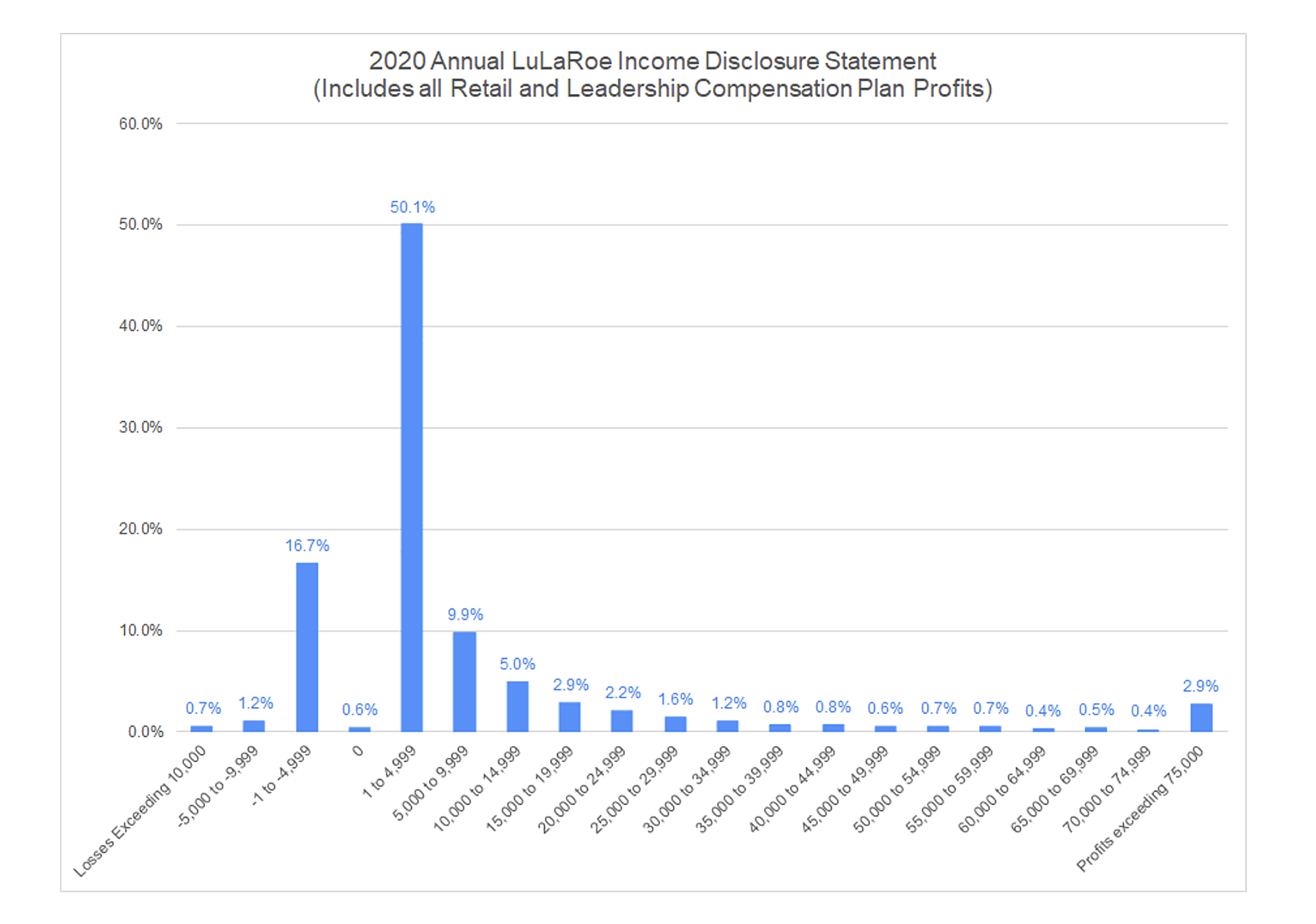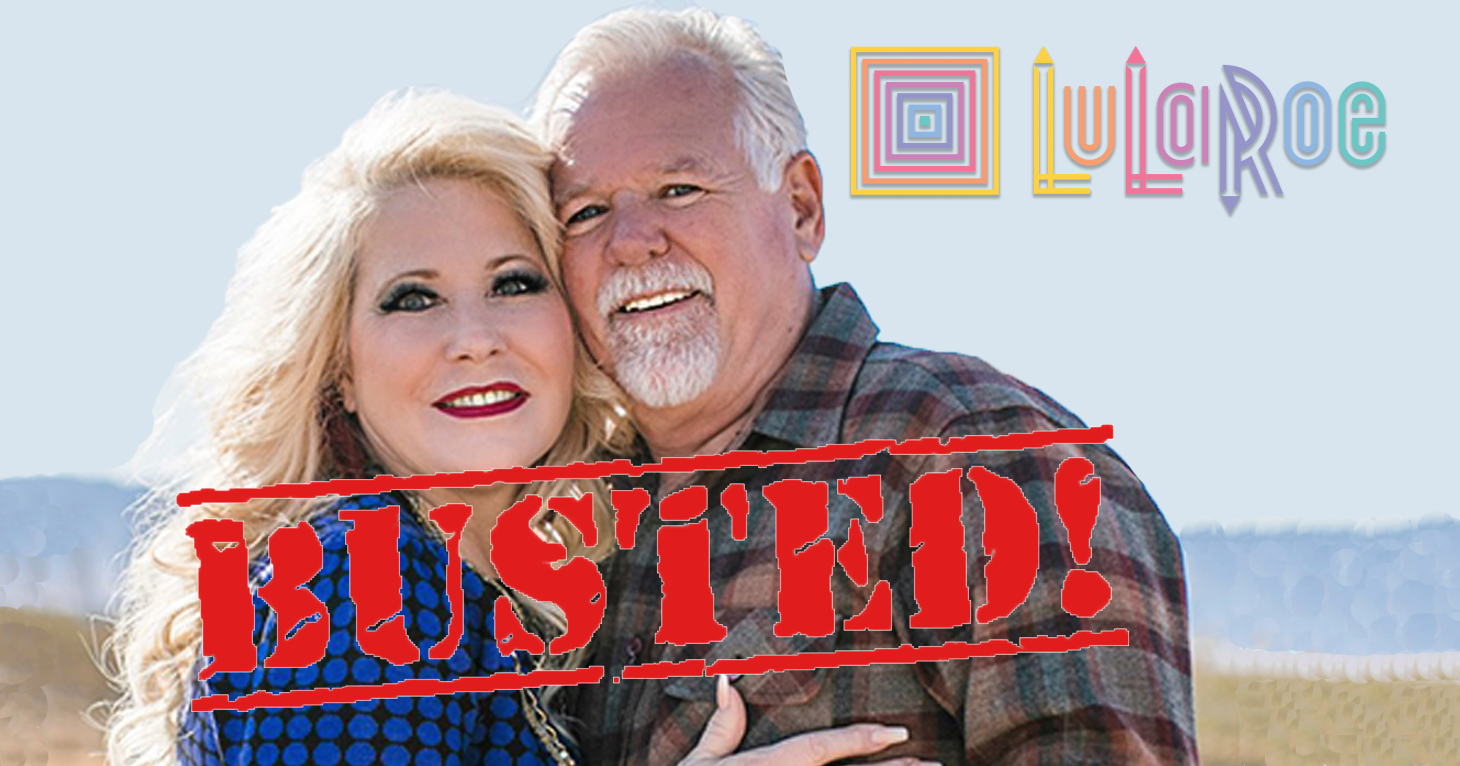
The Cost of Doing Business
Comparing the amount companies agree to pay to settle deceptive marketing charges with their annual revenue.
TINA.org alerts Washington AG’s office to deceptive income claims and more.
|
UPDATE 4/30/21: Following TINA.org’s complaint to the Washington attorney general’s office, LuLaRoe has added a link to a “Washington Income Disclosure” to a navigation bar at the bottom of its website (see before and after). The Washington-specific income disclosure statement includes a chart of the annual gross profits of Washington retailers in 2020, indicating losses in red and profits in blue in accordance with the consent decree LuLaRoe entered into with Washington state in February. Our original story follows.
Two months ago, when California-based clothing Multilevel Marketing – a way of distributing products or services in which the distributors earn income from their own retail sales and from retail sales made by their direct and indirect recruits. LuLaRoe and its founders settled pyramid scheme allegations with Washington state, they were no doubt relieved to be putting the matter behind them. But the settlement agreement places ongoing obligations on the defendants that they are already failing to meet. As such, TINA.org has sent a complaint letter to the Washington AG’s office alerting it to the fact that LuLaRoe and its founders are currently violating the February 2021 settlement agreement.
Specifically, the consent decree requires that the company not only ensure that it does not operate a pyramid scheme but also requires that it not promote the LuLaRoe business opportunity using atypical income claims without clearly and conspicuously disclosing how much the typical distributor earns. The agreement also requires that LuLaRoe publish a fact-specific income disclosure statement so that Washington residents know just how much a typical LuLaRoe distributor actually earns (or doesn’t earn as the case may be). Unfortunately, LuLaRoe seems to be having difficulty complying with these latter two requirements.
TINA.org has collected a sampling of more than 60 deceptive income claims currently being used by the company to promote the LuLaRoe business opportunity that violate the settlement agreement, in addition to FTC law. (Of note, while the majority of the claims were published before LuLaRoe settled with Washington, they continue to garner views and remain a part of the company’s deceptive marketing campaign.) By way of example, one video prominently featured on the LuLaRoe website includes founder DeAnne Stidham (aka Brady) telling consumers:
We knew we wanted a business that would help others to succeed. … To me, I want to see more people debt free. I want to see more people that are independent financially.
Earlier in the same video, LuLaRoe’s Chief Marketing Officer Justin Lyon tells consumers:
What stood out to me was seeing how it was literally affecting each of these families’ lives. What they were able to then do for their family, whether it was making more money, going on a trip, being able to pay for bills they didn’t know they could pay…
Nowhere in this video are consumers informed that the typical LuLaRoe distributor makes little to no money, or that LuLaRoe distributors are more likely to end up bankrupt than to reach the highest tier in the company’s distributor ranks.
The consent decree also requires LuLaRoe to maintain “unmodified graphics” in its income disclosure as depicted in the consent decree, which includes, among other things, the annual retail profit bar graph (below) that differentiates losses from gains by using two contrasting colors, red versus blue (IFR stands for independent fashion retailer, which is how LLR refers to distributors).
By contrast, the income disclosure statement currently published on LuLaRoe’s website has been materially modified from the consent decree graphic by changing the color of the red bars so that consumers can no longer differentiate between gross losses and gains via color, thus deemphasizing the fact that nearly 20 percent of LuLaRoe distributors either made no money or lost money last year.
Since its founding LuLaRoe and its founders have pushed the false narrative that parents can stay home with their kids and make full-time pay working part-time with the LuLaRoe business opportunity. It is time that LuLaRoe and its founders stop with the deception. And if they can’t comply with the law on their own, TINA.org is only too happy to supply Washington state regulators with the evidence they need to hold LuLaRoe and its founders accountable.
For more of TINA.org’s coverage of LuLaRoe, click here.
Comparing the amount companies agree to pay to settle deceptive marketing charges with their annual revenue.
Settlement avoids a trial that had been scheduled to begin on Feb 16.
LuLaRoe’s founders on the hotseat in Washington’s pyramid case against the company.


